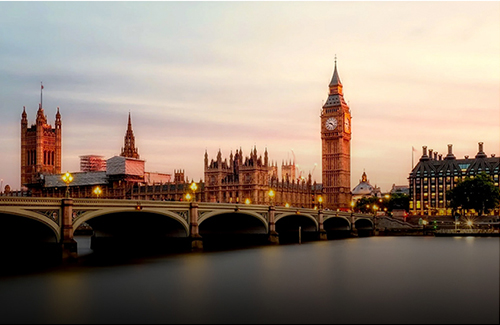Study. Work. Live in
UK
Get started


United Kingdom, island country located off the northwestern coast of mainland Europe. The United
Kingdom
comprises the whole of the island of Great Britain—which contains England, Wales, and Scotland—as
well as the
northern portion of the island of Ireland.
The capital is London, which is among the world's leading commercial, financial, and cultural
centres. Other
major cities include Birmingham, Liverpool, Manchester, Belfast, Edinburgh, Glasgow in Scotland and
Swansea
and Cardiff in Wales. 83.2 % of the population is urban in the UK.
The main language in the UK is English, which is spoken throughout the whole country.
The UK has a temperate climate. In general, this means that Britain gets cool, wet winters and warm,
wet
summers. The weather conditions are also very changeable.
The UK is one of the world,s most popular destinations to study higher education, with more than
500,000
international students enrolling each year. One of the world,s leading destinations for
international
students, second only to the USA. UK universities are among the best in the world, and consistently
perform
well in world rankings. They also have a reputation for world-class research.
There are more than 395 universities and colleges, offering over 50,000 undergraduate to higher
education
courses across the UK.









The best universities in the UK are also among the very best in the world. The Russell Group is a self-selected association of twenty-four public research universities in the United Kingdom. The Russell Group list is often considered to be the gold standard of academia in the UK; they frequently hit the highest standards of academic, sporting and research excellence.

Tuition fees for UK undergraduate and graduate degrees generally range from $12,000 - and goes up to £38,000 or more for medical degrees.
Cost of living is higher in London and South East England compared to the rest of England and Northern Ireland, Scotland and Wales. This means that studying in Universities like University College London (UCL), Imperial, and Oxford would prove to be more expensive than getting a seat in Nottingham, Cardiff, or Leicester
While these costs may be daunting, remember that most UK universities offer shorter programs compared to countries such as the US (three years for the average undergraduate degree instead of four, and one year for a master,s degree instead of two), so you may be able to subtract a year's worth of fees and living costs from your total budget.
To Know More Book an Appointment
There are mainly two intakes in UK, September/October Intake and January/February Intake. Some universities in UK also provide April / May intake for a few courses.
The main intake in UK is September intake. It is also called autumn intake in UK. Most Universities in UK offer all the courses in the September intake. The application deadlines for the September intake will fall between February and May of that academic year.
January intake is the secondary intake. Less courses are offered in January intake as compared to September intake, but this intake gives an opportunity to the students who have missed the admission in the main intake. The application deadlines will fall between June and September, and will change from course to course and University to University.
Universities such as Coventry, Northumbria, Southampton Solent, and University of Bedfordshire etc. offer May intake in a few courses for international students.
To Know More Book an Appointment
The UK university entry requirements vary depending on the type of the course you,re applying for, the academic level, your nationality, and the University you,re applying for.
The university entry requirements are made to assess your suitability for the degree course you,re applying for. Said otherwise the application process highly depends on matching with entry requirements and therefore is a section you must pay extra attention.
Students who are seeking admissions for post graduate courses need to have a graduate degree of 3 years duration in any stream equivalent to the UK,s bachelor degree.
Here are the major UK university entry requirements:

For undergraduate admissions, the Universities and Colleges Admissions Service (UCAS) handles all applications in the UK. Please note that UCAS application deadlines vary annually. For entry into the 2025 academic year, applications for most undergraduate courses must be submitted via the UCAS portal by January 29, 2025.
The application process takes place online, and you can choose up to five different courses with some restrictions on how they may be combined. There is a fee for making an application via UCAS.
UK universities handle their own postgraduate applications and you can often apply directly through their website.
To Know More Book an Appointment
The Graduate Route is a new UK post-study work visa to be introduced for international students graduating in summer 2021 or later. It will allow you to live and work in the UK for up to two years after a Masters, or three years after a PhD.
The Graduate Route will be available to international students who have a valid student visa at the time of application and have successfully completed a degree at undergraduate level or above at a Higher Education Provider with a track record of compliance.
Successful applicants on this route will be able to stay and work, or look for work, in the UK at any skill level for a maximum period of two years if they have successfully completed an undergraduate or master's degree. PhD graduates will be able to stay for three years. Graduates will be able to switch into skilled work once they have found a suitable job.
To Know More Book an Appointment
Applying for Permanent Residence in the UK for non-EU citizens is reasonably straightforward. If you have lived in the UK for a set number of years, legally or otherwise, you can apply for permanent residency.
Also known as Indefinite Leave to Remain (ILR), UK permanent residence is an immigration status granted to a person without the Right of Abode. You will no longer have any immigration restrictions on working or business in the UK and no time limits on your stay.
An individual with permanent resident status can live and work in the UK indefinitely. You will no longer have any immigration restrictions on working or business in the UK and no time limits on your stay. However, the right can lapse if an individual spends more than 2 years continuously outside the country
To Know More Book an Appointment
The country's unemployment rate currently stands at a relatively low 4%, and the graduate labour market remains robust and by some measures is as strong as it has been for some time. Competition for graduate jobs is fierce but candidates with the right qualifications, skills and experience stand a good chance of employment.
Language skills are increasingly important, making many foreign nationals desirable candidates. The UK has many international communities, so as a foreign worker you'll be in good company.
With the UK's diverse job sectors, good working conditions and numerous employment opportunities, it's no surprise that it's a popular destination for international graduates wanting to kick start their careers. Work experience opportunities are available in almost every sector and will vary in length, depending on the organization.
To Know More Book an Appointment